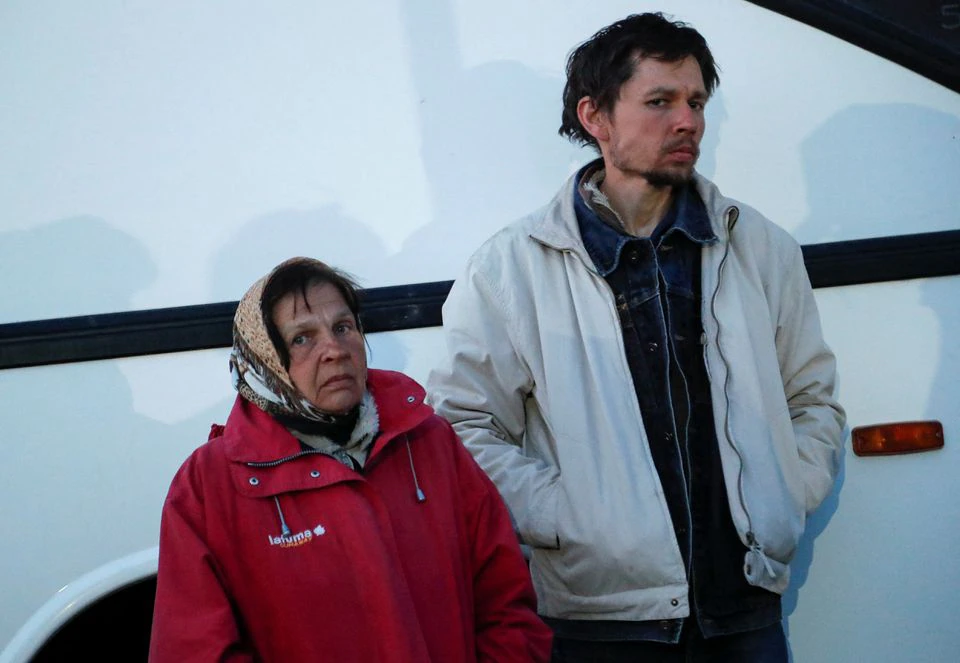
The governor of the Luhansk area reported on Sunday that Russia bombed a school in the eastern Ukrainian hamlet of Bilohorivka, killing two people and leaving 60 people dead in the rubble.
According to Governor Serhiy Gaidai, Russian forces detonated a bomb on the school where roughly 90 people were refuge on Saturday afternoon, causing a fire to overtake the structure.
‘After nearly four hours, the fire was put out, the rubble was cleaned, and regrettably, the deaths of two persons were discovered,’ Gaidai said on the Telegram messaging service.
‘Thirty persons were rescued from the rubble, with seven being injured. Under the debris of buildings, sixty individuals were estimated to have died.’
Ukraine and the West have accused Russian soldiers of killing civilians and committing war crimes, accusations that Moscow denies.
Thousands have died, cities have been damaged, and 5 million Ukrainians have fled abroad as a result of Russia’s 10-week war on Ukraine.
Mariupol, a strategically important port city for Russian forces, has been virtually destroyed, with the last 300 inhabitants trapped in the bombed-out Azovstal steelworks being evacuated on Saturday. The injured and medics will be the first to be evacuated from the steelworks.
Ukrainian soldiers in the factory have pledged not to surrender, and Russian forces are attempting to declare victory in the long-running war for the massive complex in time for Victory Day festivities in Moscow on Monday.
The Soviet-era Azovstal steel factory has become a symbol of resistance to Russia’s attempt to take large swathes of eastern and southern Ukraine.
In a show of unity ahead of Victory Day, when President Vladimir Putin inspects a large military parade in Moscow, US Vice President Joe Biden and other G7 leaders will make a video conversation with Ukrainian President Volodymyr Zelenskiy on Sunday.
‘Putin’s savage strike is harming peace and security across Europe,’ British Prime Minister Boris Johnson said in a statement on Saturday, promising greater military assistance.
Britain allocated an additional 1.3 billion pounds ($1.6 billion), more than doubling its previous spending commitments and marking the country’s highest pace of conflict spending since the Iraq and Afghanistan wars.
Putin’s Victory Day address could provide insight into the war’s future, which he began on February 24 with an unsuccessful assault on Kyiv, Ukraine’s capital. In the face of heavy resistance, Russia’s efforts have been hampered by logistical and equipment issues, as well as significant casualties.
According to US Central Intelligence Agency Director William Burns, Putin believes that ‘doubling down’ on the confrontation will result in a better end for Russia.
Burns told a Financial Times event, ‘He’s in a frame of mind where he doesn’t believe he can afford to lose.’
Others believe Putin will proclaim the mission a success. According to rumours, the Kremlin was in Mariupol planning for a Victory Day parade in the damaged city, according to Ukraine’s defence intelligence agency.
Requests for feedback on what Putin could say in the address, which will be delivered from the Red Square podium in front of Vladimir Lenin’s Mausoleum, went unanswered.
The conflict is described by Moscow as a ‘special military operation’ aimed at disarming Ukraine and removing anti-Russian chauvinism instilled by the West. Ukraine and the West accuse Russia of starting a conflict without warning.
Mariupol, located between the Crimean Peninsula, which Moscow annexed in 2014, and areas of eastern Ukraine annexed by Russia-backed separatists the same year, is critical in connecting the two Russian-controlled territories and limiting Ukrainian exports.
Ukraine’s general staff warned on Sunday that Ukrainian soldiers near the Azovstal complex were still being blockaded, and Russia’s assault on Mariupol continued with artillery and tanks.

Post Your Comments